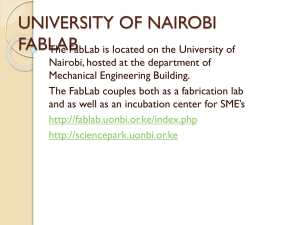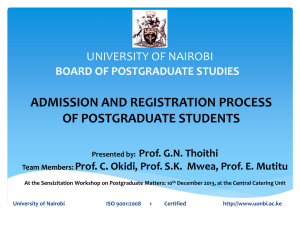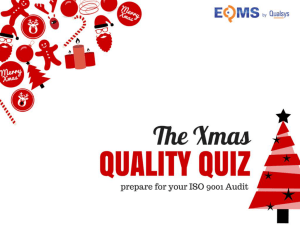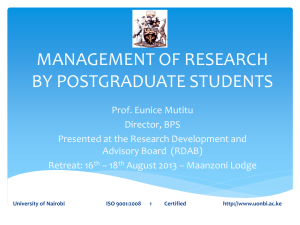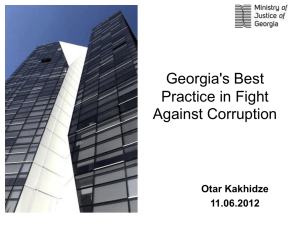Corruption document - College of Biological and Physical Sciences
advertisement
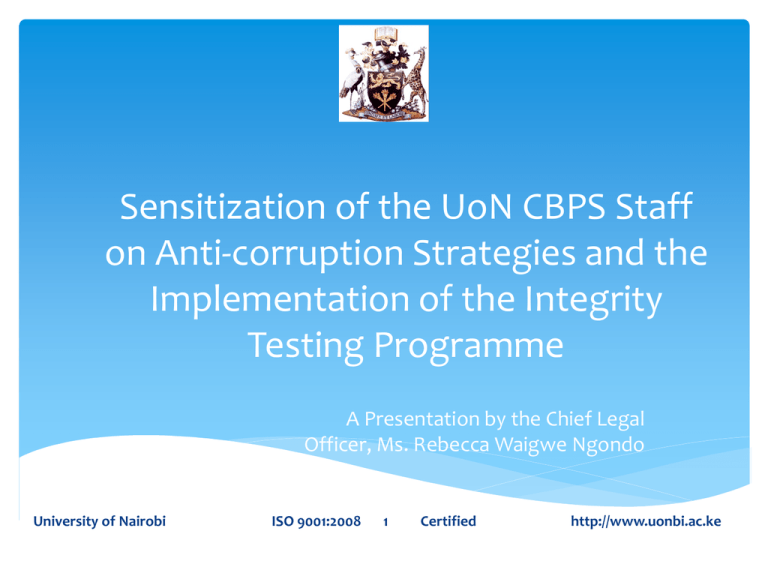
Sensitization of the UoN CBPS Staff on Anti-corruption Strategies and the Implementation of the Integrity Testing Programme A Presentation by the Chief Legal Officer, Ms. Rebecca Waigwe Ngondo University of Nairobi ISO 9001:2008 1 Certified http://www.uonbi.ac.ke The University of Nairobi Vision: A world-class university committed to scholarly excellence University of Nairobi ISO 9001:2008 2 Certified http://www.uonbi.ac.ke OVERVIEW OF THE CORRUPTION ERADICATION EXERCISE IN THE UNIVERSITY OF NAIROBI WHAT IS CORRUPTION? University of Nairobi ISO 9001:2008 3 Certified http://www.uonbi.ac.ke OVERVIEW OF THE CORRUPTION ERADICATION EXERCISE IN THE UNIVERSITY OF NAIROBI 1.0 WHAT IS CORRUPTION? Derived from Latin word – “corruptus” meaning “to break”. Symbolizes a breakdown in: a) Ethical and moral values; b) Systems and institutions of governance; c) Societal traditions and personal behaviors. University of Nairobi ISO 9001:2008 4 Certified http://www.uonbi.ac.ke OVERVIEW OF THE CORRUPTION ERADICATION EXERCISE IN THE UNIVERSITY OF NAIROBI 1.0 WHAT IS CORRUPTION CONT’D? There is no universal definition of corruption, but the following are a few opinions and definitions of corruption obtained from different sources; a) b) c) d) Abuse of socially accepted norms; Evil immoral or wicked behavior Unlawful acquisition of property at the expense of the public. Misuse of office or authority for the benefit of an individual or a group through coercion, undue influence, misrepresentation, falsification, dishonesty or any other improper acts or means in breach of laws, regulations and the rule in force. University of Nairobi ISO 9001:2008 5 Certified http://www.uonbi.ac.ke OVERVIEW OF THE CORRUPTION ERADICATION EXERCISE IN THE UNIVERSITY OF NAIROBI General Olusegun Obasanjo, Former President of Nigeria, defined corruption as: “The misuse of public office for profit or advantage, Acts of commission and omission in your employment resulting in a loss or disadvantage to your employer and private gain to you or any other person associated with you.” (Obasanjo, 1994). The World Bank defines corruption as: “The abuse of power, most often for personal gain or for the benefit of a group which one owes allegiance. It can be motivated by greed, by the desire to retain or increase one’s power or, perversely enough, by the belief in a supposed greater good…while the term “corruption” is most often applied to abuse of public power by politicians or civil servants, it describes a pattern of behavior that can be found in every sphere of life” (Stapenhurst and Sedigh, 1999). University of Nairobi ISO 9001:2008 6 Certified http://www.uonbi.ac.ke OVERVIEW OF THE CORRUPTION ERADICATION EXERCISE IN THE UNIVERSITY OF NAIROBI 1.2 Types of Corruption: Grand Corruption – mega corruption, misuse or theft of large amounts of public funds by high level officials and influential politicians. Has significant negative economic impact to a country. Manifested in looting of public coffers and public corporations. Petty Corruption - involves transactions by individual public officials at all levels, and many relatively small amounts of money or favors. Transaction could be in the form of bribes, kickbacks, diverting public funds. University of Nairobi ISO 9001:2008 7 Certified http://www.uonbi.ac.ke OVERVIEW OF THE CORRUPTION ERADICATION EXERCISE IN THE UNIVERSITY OF NAIROBI 1.3 Other Types: Transactive – mutual arrangement between giver and taker to the advantage of both parties (business and government). Extortive – giver is compelled to bribe to avoid harm. Defensive – by a victim of extortive corruption, in self defense. Investive – offer of good and services without any direct link to a particular favor, but in anticipation for future favors. Autogenic - involves the person or self – making fraudulent claims but with everything properly accounted for . Nepotistic – unjustified appointments of friends, relatives and cronies to public offices or according favored treatment in pecuniary and other forms, violating the norms and rules of the undertaking. Collusive – when people trusted with authority agree to indulge in corrupt practices jointly. University of Nairobi ISO 9001:2008 8 Certified http://www.uonbi.ac.ke OVERVIEW OF THE CORRUPTION ERADICATION EXERCISE IN THE UNIVERSITY OF NAIROBI 1.4 Causes of Corruption: Wide authority and discretion, little or no accountability Limited risks or exposure for punishment – inadequate or ineffective controls, monitoring, detection and prosecution Poor terms and conditions of employment Availability of multiple opportunities for enrichment – in the procurement and revenue collection. Weak laws – ambiguous ill-defined legislation that grant large margins of discretion that create a haven of corruption. Access to and control over means of corruption - administrative processes – procurement, access to offshore accounts, the techniques of money laundering. Corruption thrives in weak or bad governance, where controls are weak, decision making opaque, arbitrary. University of Nairobi ISO 9001:2008 9 Certified http://www.uonbi.ac.ke OVERVIEW OF THE CORRUPTION ERADICATION EXERCISE IN THE UNIVERSITY OF NAIROBI 1.4 Causes of Corruption Cont’d: Poor and selective enforcement of laws or perceived impunity Cultural acceptance of corruption – tolerance for corruption, not stigmatized, entrenched impunity and culture of corruption in society Moral decadence in society Others a) Poor leadership b) Political patronage c) Poor planning d) Greed e) Poverty and unemployment University of Nairobi ISO 9001:2008 10 Certified http://www.uonbi.ac.ke OVERVIEW OF THE CORRUPTION ERADICATION EXERCISE IN THE UNIVERSITY OF NAIROBI 1.5 Challenges of dealing with Corruption as a crime : Lack of verifiable information that is received from public servants or citizens Insidious/secret nature of corruption The lack of individual victims that would come forward with information about an act of corruption and thus trigger an investigation, especially when it involves persons in high places . In most of the cases, everyone involved is a beneficiary and has an interest in preserving secrecy. Unlike many traditional crimes such as robbery or murder, corruption does not have a clear victim likely to complain and there is no overt occurrence likely to be reported by witness. It is exceptionally difficult to obtain clear evidence of the actual payment of a bribe. University of Nairobi ISO 9001:2008 11 Certified http://www.uonbi.ac.ke OVERVIEW OF THE CORRUPTION ERADICATION EXERCISE IN THE UNIVERSITY OF NAIROBI 1.6 Some Effects of Corruption: Corruption affects both the individual and the nation. Poor economic performance Disregard for standards & pillars of integrity Withdrawal of international aid & lack of investments Looting of public resources & capital flight Conspicuous consumption Loss of confidence in the public service to deliver Increased insecurity Exorbitant prices for goods and services General moral decay Impunity Poor physical and social infrastructure – medical, roads etc University of Nairobi ISO 9001:2008 12 Certified http://www.uonbi.ac.ke OVERVIEW OF THE CORRUPTION ERADICATION EXERCISE IN THE UNIVERSITY OF NAIROBI 1.7 Benefits of Preventing Corruption: Economic growth & conducive business environment. Poverty eradication & job creation. Increase in domestic & foreign investments. Improved social behaviour/moral standards. Fidelity to the laws, regulation etc. Renewed confidence of our development partners. Effective, responsive, responsible, fair & efficient public service. More resources available to govt for health care, infrastructure, education, security etc. Increased revenue. Reduced crime. University of Nairobi ISO 9001:2008 13 Certified http://www.uonbi.ac.ke OVERVIEW OF THE CORRUPTION ERADICATION EXERCISE IN THE UNIVERSITY OF NAIROBI According to The Anti-Corruption and Economic Crimes Act, 2003, corruption and economic crimes include the following: SECTION CORRUPTION AND ECONOMIC CRIMES Section 2 Section 39 Bribery Fraud Embezzlement or misappropriation of public funds Abuse of Office Breach of trust Dishonesty in connection with taxation or election of persons to public offence. Inducement or rewards in order for one to do or not do something related to ones official duties Favoritism or discrimination Soliciting, receiving rewards or inducements in order to show favoritism or discrimination Giving or agreeing to give an inducement or reward to someone in order to make him/her to do or not to do something, in order to make him or her show favour or discrimination. University of Nairobi ISO 9001:2008 14 Certified http://www.uonbi.ac.ke OVERVIEW OF THE CORRUPTION ERADICATION EXERCISE IN THE UNIVERSITY OF NAIROBI SECTION CORRUPTION AND ECONOMIC CRIMES Section 40 Secret inducements for advice Section 41 Section 42 Knowingly using or giving a statement or a document that contains anything that is false or misleading. Having a direct or indirect private interest in a decision and failing to declare the interest. Participating in the proceedings and voting on a decision in which one has a direct or indirect private interest. Being a public officer but knowingly having or holding an interest in a contract (not employment contract) agreement or investment connected with the public body one is working for. Section 43 Section 44 University of Nairobi Receiving, soliciting or agreeing to receive inducement or reward in order to influence the appointment of a person as a trustee of a property. Giving or offering, or agreeing to give or offer an inducement or reward in order to influence the appointment of a person as trustee of a property. Receiving, soliciting or agreeing to receive inducement or reward with respect to rigging of a tender bid. ISO 9001:2008 15 Certified http://www.uonbi.ac.ke OVERVIEW OF THE CORRUPTION ERADICATION EXERCISE IN THE UNIVERSITY OF NAIROBI SECTION CORRUPTION AND ECONOMIC CRIMES Section 45 Fraudulently or otherwise unlawfully acquiring public property or public service benefit. Unlawfully mortgaging, charging or disposing of any public property Unlawfully damaging public property Unlawfully interfering with the functions of a computer or any other electronic machinery so that it directly or indirectly results in loss of public revenue or in some negative effect on public revenue or any other public service. Unlawfully failing to pay any taxes or any fees, levies or charges payable to any public body…or obtaining any exemption, remission, reduction or abatement from payment of any such taxes, fees, levies or charges. Fraudulently making payment from public revenue for substandard or defective goods. Fraudulently making payment for goods not supplied or not supplied in full. Fraudulently making payments for services not rendered or not adequately rendered. Willfully or carelessly failing to comply with any law or applicable procedures and guidelines relating to the procurement, allocation, sale or disposal of property tendering of contracts, management of funds or incurring of expenditures. Engaging in a project without proper planning. University of Nairobi ISO 9001:2008 16 Certified http://www.uonbi.ac.ke OVERVIEW OF THE CORRUPTION ERADICATION EXERCISE IN THE UNIVERSITY OF NAIROBI SECTION CORRUPTION AND ECONOMIC CRIMES Section 46 Using ones office to improperly give a benefit to oneself or to anyone else. Section 47 Holding, receiving, concealing or transacting business with property that was acquired corruptly. University of Nairobi ISO 9001:2008 17 Certified http://www.uonbi.ac.ke OVERVIEW OF THE CORRUPTION ERADICATION EXERCISE IN THE UNIVERSITY OF NAIROBI 1.8 Individual Level At the individual level, corruption leads to: a) Loss of confidence in the ability of the public service bodies to provide adequate services; b) Increased insecurity in the community; c) Low purchasing power; d) Paying higher or exorbitant prices of goods and services; e) General moral decay in the society due to erosion of values and standards; f) Receiving sub-standard services and products; and g) Payment of bribes to access essential services. University of Nairobi ISO 9001:2008 18 Certified http://www.uonbi.ac.ke OVERVIEW OF THE CORRUPTION ERADICATION EXERCISE IN THE UNIVERSITY OF NAIROBI 1.8.1 Role of the Individual in the fight against Corruption: Respect and protect public property. Avoid engaging in corrupt practices. Never give or receive a bribe. Never falsify a claim. Name and shame corrupt people/stigmatize corrupt people. Talk to every one about the evils of corruption. Appreciate and reward hard work, honesty and integrity. Give advise and suggestions to management on how to fight corruption in your organization. University of Nairobi ISO 9001:2008 19 Certified http://www.uonbi.ac.ke OVERVIEW OF THE CORRUPTION ERADICATION EXERCISE IN THE UNIVERSITY OF NAIROBI 1.8.2 Individual responsibility: We ourselves feel that what we are doing is a drop in the ocean. But the ocean would be less because of that missing drop” “Do not wait for leaders, do it alone person to person” University of Nairobi ISO 9001:2008 20 Certified http://www.uonbi.ac.ke OVERVIEW OF THE CORRUPTION ERADICATION EXERCISE IN THE UNIVERSITY OF NAIROBI 2.0 MEANING OF CORRUPTION AND ECONOMIC CRIME 2.1 The Anti-Corruption and Economic Crimes Act defines corruption and economic crimes as follows: 2.1.1 Corruption means: - a) b) c) d) e) f) g) h) An offence under section 39-44, 46 and 47 namely; Bribing of agents – s. 39 Secret inducement for advice – s. 40 Deceiving principal – s. 41 Conflict of interest – s. 42 Improper benefits to trustees for appointment – s43 Bid rigging – s. 44 Abuse of office – s. 46 Dealing with suspect property – s. 47 University of Nairobi ISO 9001:2008 21 Certified http://www.uonbi.ac.ke OVERVIEW OF THE CORRUPTION ERADICATION EXERCISE IN THE UNIVERSITY OF NAIROBI 2.1.2 a) b) c) d) e) Corruption also means any offence whose ingredients include: Bribery Fraud Embezzlement or misappropriation of public funds Breach of trust Offences involving the element of dishonesty in connection with any tax rate, imposed levies and election of persons to public offence. University of Nairobi ISO 9001:2008 22 Certified http://www.uonbi.ac.ke OVERVIEW OF THE CORRUPTION ERADICATION EXERCISE IN THE UNIVERSITY OF NAIROBI 2.2 IT is no defense When a person is charged with any offence under the Act he/she cannot defend himself by arguing that the receiving, soliciting, giving or offering is; a) b) c) d) Customary in his area or business or profession or that Was not within his power Did not intend to do the act or make the omission The act or omission did not occur University of Nairobi ISO 9001:2008 23 Certified http://www.uonbi.ac.ke OVERVIEW OF THE CORRUPTION ERADICATION EXERCISE IN THE UNIVERSITY OF NAIROBI 2.3 THE PUBLIC OFFICER ETHICS ACT This Act came into operation together with the AntiCorruption and Economic Crimes Act on 2nd May, 2003. It complements the latter Act. The purpose of the Act is to advance the ethics of public officers by providing a code of conduct and ethics and requiring wealth declarations from public officers. University of Nairobi ISO 9001:2008 24 Certified http://www.uonbi.ac.ke OVERVIEW OF THE CORRUPTION ERADICATION EXERCISE IN THE UNIVERSITY OF NAIROBI 2.3.1 Definition of a Public Officer A public officer is defined as any officer, employee or member of any of the following:- a) b) c) d) e) f) The Government or any Department, service or undertaking of the Government; The National Assembly or the Parliamentary Service; A local authority; A corporation, Council, Board, Committee which has power to act under any written law relating to: local government, public health, administer funds belonging to or granted by the Government; administer money raised by rates, taxes, or charges under any such law; A public university; and Any other body prescribed by regulation for purposes of the Act. University of Nairobi ISO 9001:2008 25 Certified http://www.uonbi.ac.ke OVERVIEW OF THE CORRUPTION ERADICATION EXERCISE IN THE UNIVERSITY OF NAIROBI 2.3.2 Responsible Commissions The Act establishes various bodies to be responsible Commissions for the purpose of advancing the integrity of public officers. These are bodies which usually exercise disciplinary control over public officers in designated departments. University of Nairobi ISO 9001:2008 26 Certified http://www.uonbi.ac.ke OVERVIEW OF THE CORRUPTION ERADICATION EXERCISE IN THE UNIVERSITY OF NAIROBI 2.3.3 Specific Codes of Conduct and Ethics Each Commission is required to establish and enforce a specific Code of Conduct and Ethics for the public officers for whom it is the Responsible Commission. The specific code should include all the provisions contained in the General Code of Conduct. However, Responsible Commissions may include other requirements that go beyond the provisions of the General Code of Conduct in the Kenya Gazette once they have been developed. Where a Responsible Commission has not developed its own Specific Code of Conduct and Ethics, the General Code of Conduct and Ethics shall apply. University of Nairobi ISO 9001:2008 27 Certified http://www.uonbi.ac.ke OVERVIEW OF THE CORRUPTION ERADICATION EXERCISE IN THE UNIVERSITY OF NAIROBI 2.3.4 General Principles of Ethical Conduct 2.3.4.1 The Act subject Public Officers to the following general principles: o o o o o o o A public officer shallTo the best of his/her ability, carry out his or her duties and ensure that the services that he or she provides are provided efficiently; Carry out his duties in a way that maintains public confidence in the integrity of his office; Treat the public and his fellow public officers with courtesy and respect; Seek to improve the standards of performance and level of professionalism in his organization; Observe the ethical and professional requirements of professional body in which he is a member; Observe official working hours and not be absent without proper authorization or reasonable cause; Maintain an appropriate standard of dress and personal hygiene; and discharge any professional duties in a professional manner; University of Nairobi ISO 9001:2008 28 Certified http://www.uonbi.ac.ke OVERVIEW OF THE CORRUPTION ERADICATION EXERCISE IN THE UNIVERSITY OF NAIROBI A public officer shall- o Carry out his/her duties in accordance with the law. He/she shall not violate the rights and freedoms of any person under the constitution; o Not to use his office to improperly enrich himself/herself; o Avoid being in a position in which his personal interest conflict with his official duties; o Not use his/her place of work for soliciting or collecting harambees or use his/her official position to collect harambees; o Not compromise the security interests of Kenya; o Protect public property entrusted in him/her; o Observe political neutrality (This does not apply to members of the Senate and National Assembly or a County Representative of a county ward); University of Nairobi ISO 9001:2008 29 Certified http://www.uonbi.ac.ke OVERVIEW OF THE CORRUPTION ERADICATION EXERCISE IN THE UNIVERSITY OF NAIROBI A public officer shallo Not practice nepotism or favoritism; o Give honest and impartial advice without fear or favour; o Not knowingly give false or misleading information to members of the public or any other public officer; o Conduct his/her private affairs in a way that maintains public confidence, in line with integrity of his/her office; o Pay all lawful taxes and not neglect financial obligations; o Not sexually harass a member of the public or a fellow public officer; o Ensure that appointments are made on the basis of integrity, competence and suitability; and o Report any improper instructions given to him/her. University of Nairobi ISO 9001:2008 30 Certified http://www.uonbi.ac.ke OVERVIEW OF THE CORRUPTION ERADICATION EXERCISE IN THE UNIVERSITY OF NAIROBI 2.3.5 Wealth Declarations Every public officer is required to biennially declare his/her income, assets and liabilities and those of his/her spouse, and dependent children under the age of 18 years. The declaration must be truthful and accurate. Officers must also provide clarifications when required to do so without undue delay. The rationale for wealth declarations is to match the assets and liabilities of public officers with their incomes and seek clarification for any disproportion there might be. The declarations are to be kept for at least 5 years after the person ceases to be a public officer. University of Nairobi ISO 9001:2008 31 Certified http://www.uonbi.ac.ke OVERVIEW OF THE CORRUPTION ERADICATION EXERCISE IN THE UNIVERSITY OF NAIROBI 2.3.5 Wealth Declarations (Cont’d) The Declaration is confidential but information in the Declaration may be disclosed or accessed or acquired by any person upon application to the responsible Commission in the prescribed manner. The applicant must show to the satisfaction of the responsible Commission that he/she has a legitimate interest and a good cause in furtherance of the objectives of the Act. However, the affected party must be given a chance to make representation on the matter before the Commission decides in the affirmative. University of Nairobi ISO 9001:2008 32 Certified http://www.uonbi.ac.ke OVERVIEW OF THE CORRUPTION ERADICATION EXERCISE IN THE UNIVERSITY OF NAIROBI 2.3.6 Offences and Penalties under the Act 2.3.6.1 The Act provides for the following offences: a) Anyone who unlawfully publishes information contained in a declaration without the permission of a responsible Commission is liable to fine not exceeding Kshs. 500,000/= or imprisonment for a term not exceeding five (5) years or both. b) Anyone who fails to submit a declaration or clarification, or submits a Declaration or clarification containing information that he knows or ought to know is false or misleading commits an offence and is liable to punishment of a fine not exceeding Kshs. 1,000,000/= or imprisonment for a term not exceeding one (1) year or both. c) Anyone who obstructs or hinders officers acting under the Act commits an offence and is liable to punishment of a fine not exceeding Kshs. 5,000,000/= or imprisonment for a term not exceeding five (5) or both. University of Nairobi ISO 9001:2008 33 Certified http://www.uonbi.ac.ke OVERVIEW OF THE CORRUPTION ERADICATION EXERCISE IN THE UNIVERSITY OF NAIROBI 2.3.7 Disciplinary Action A Responsible Commission or a body or person with power to take disciplinary action against a public officer may take such action against a public officer for breach of the Code of Conduct and Ethics. The action taken shall be made public. If the Responsible Commission after investigation is of the view that a civil or criminal proceeding is necessary, it shall refer the matter to the Attorney General or other appropriate authority for action. University of Nairobi ISO 9001:2008 34 Certified http://www.uonbi.ac.ke OVERVIEW OF THE CORRUPTION ERADICATION EXERCISE IN THE UNIVERSITY OF NAIROBI Implement Corruption Prevention Strategies coordinated by the Corruption Prevention/Integrity Committees. On June 22 2010 the nine (9) University of Nairobi Corruption Prevention Committees were officially launched at the Central Catering Unit by the then Acting Director, Kenya Anti Corruption Commission, Dr. John Mutonyi. a) b) c) d) University Central Corruption Prevention Committee Six (6) Colleges Corruption Committees Students Welfare Authority Corruption Prevention Committee Central Units Corruption Prevention Committee. University of Nairobi ISO 9001:2008 35 Certified http://www.uonbi.ac.ke OVERVIEW OF THE CORRUPTION ERADICATION EXERCISE IN THE UNIVERSITY OF NAIROBI The nine corruption prevention committees have had monthly and quarterly meetings on the sensitization of anti-corruption strategies and the integrity testing program. The University has over sixty one (61) Corruption/ Complaints Reporting boxes strategically placed throughout the colleges, departments and units. University of Nairobi ISO 9001:2008 36 Certified http://www.uonbi.ac.ke OVERVIEW OF THE CORRUPTION ERADICATION EXERCISE IN THE UNIVERSITY OF NAIROBI The University has telephones/ mobile phones through which anti-corruption complaints can be reported as listed below: The College of Humanities and Social Sciences; 0703 322 666 The College of Agriculture and Veterinary Sciences; 0704 655 262, 0704 655 276 and 0704 655 263. The Central Administration; 0727 686 300. The Student Welfare Authority; 020-232 351 1. The College of Biological and Physical Sciences; 020-266 711 4. The College of Architecture and Engineering; 020-231885 5. The College of Education and External Studies; 020-252 716 1 and 0703 634 415. The College of Health Sciences; 0788 262 407 University of Nairobi ISO 9001:2008 37 Certified http://www.uonbi.ac.ke OVERVIEW OF THE CORRUPTION ERADICATION EXERCISE IN THE UNIVERSITY OF NAIROBI Establish Mechanisms to reduce Corruption related audit queries. The University of Nairobi Corruption Prevention Plan was drawn and adopted in the year 2004. A number of risk assessment reviews have been carried out culminating in the current 2012/2013 Plan. The Corruption Prevention Committees have conceptualised their activities within the University Corruption Prevention Plan which was first drafted in 2003 and was last updated in 2010 and should be an on-going process as changes take place e.g. we have a new constitution – What Changes have taken place that will affect the operations of your units, departments, Faculty/School/College/University? A Corruption Prevention Plan is not static – emerging issues could lead to Corruption risks and loopholes that will require sealing. University of Nairobi ISO 9001:2008 38 Certified http://www.uonbi.ac.ke OVERVIEW OF THE CORRUPTION ERADICATION EXERCISE IN THE UNIVERSITY OF NAIROBI The University of Nairobi adheres to the stipulations of the Anti-Corruption Policy and Economics Crimes Act, 2003 and other corruption related statutes, the Public Officer Ethics Act, 2004 and has developed the following policies which are in operation: a) The University of Nairobi Anti Corruption Policy, b) The Code of Conduct and Ethics for Public Universities, c) The University of Nairobi Code of Conduct and Ethics. University of Nairobi ISO 9001:2008 39 Certified http://www.uonbi.ac.ke OVERVIEW OF THE CORRUPTION ERADICATION EXERCISE IN THE UNIVERSITY OF NAIROBI Conduct Integrity training/sensitisation of staff to build capacity on Corruption Prevention. The University has endeavoured to build capacity and anticorruption awareness through workshops that were held throughout the year for cadres of staff both in the central administration units and at the colleges as attached. Over 1,700 staff members sensitised/trained in the financial year 2010/2011. Copies of the Resource Manual on Corruption Prevention in the Public Service have been provided to all members of the Corruption Prevention Committees to assist in the sensitization and training of staff. University of Nairobi ISO 9001:2008 40 Certified http://www.uonbi.ac.ke OVERVIEW OF THE CORRUPTION ERADICATION EXERCISE IN THE UNIVERSITY OF NAIROBI Submit Quarterly Reports using the prescribed format to Kenya Anti-Corruption Commission. While using the format prescribed by the Ethics Anti Corruption Commission, the University has already submitted Three (3) Quarterly Reports as required under the Performance Contract – 2012/2013 FY. In addition, responsible authorities at all levels in the University shall ensure that any public officer suspected of corrupt practices steps down, to allow room for investigations. University of Nairobi ISO 9001:2008 41 Certified http://www.uonbi.ac.ke OVERVIEW OF THE CORRUPTION ERADICATION EXERCISE IN THE UNIVERSITY OF NAIROBI Integrity Assurance Officers The University has Sixty One (61) trained Integrity Assurance Officers drawn from all the colleges and departments and who continuously sensitize other members of staff and provide technical guidance to the corruption prevention committees. University of Nairobi ISO 9001:2008 42 Certified http://www.uonbi.ac.ke OVERVIEW OF THE CORRUPTION ERADICATION EXERCISE IN THE UNIVERSITY OF NAIROBI Operations date for the Committees On August 2 2010 the Central Corruption Prevention Committee under the chairmanship of the Vice-Chancellor had it first meeting which set the agenda and strategies to fight corruption at the University of Nairobi. A schedule for monthly and quarterly meetings has already been prepared and will be forwarded to all Corruption Prevention Committees. University of Nairobi Anti-Corruption Policy The policy has been approved and uploaded in the University of Nairobi’s Website. Most Staff members have been sensitised on the same. University of Nairobi ISO 9001:2008 43 Certified http://www.uonbi.ac.ke OVERVIEW OF THE CORRUPTION ERADICATION EXERCISE IN THE UNIVERSITY OF NAIROBI The Vice-Chancellor appointed the University Oversight Committee which is comprised of; all the Deputy Vice-Chancellors, all the College Principals and Deputy Principals, the Chief Legal Officer who also sits on the Committee as the Program Officer and two Program Analysts. The Integrity Testing Programme Oversight Committee will formulate tests that create realistic situations to ensure that the relevant processes and procedures are adhered to strictly and also to test whether the controls put in place are operational. The identified five (5) areas prone to corrupt activities by their respective nature of operation are as listed below: a) b) c) d) e) Procurement Human Resource Finance Records Management ICT University of Nairobi ISO 9001:2008 44 Certified http://www.uonbi.ac.ke OVERVIEW OF THE CORRUPTION ERADICATION EXERCISE IN THE UNIVERSITY OF NAIROBI 2.3.8 Other statutes which complement the ACECA and POEA are- a) The Public Audit Act, 2003 (which establishes the National Audit office and generally streamlines the audit function of all public organizations including local authorities) b) The Government Financial Management Act, 2004 (which consolidates, improves streamlines key government financial process previously provided for in different codes) c) The Public Procurement and Disposal Act, 2005 (which is aimed at streamlining procurement in public institutions) d) The Privatization Act, 2005 (which aims at ensuring transparent and accountable transfer of public assets) e) The Witness Protect Act, (No. 16 of 2006) which (aimed at providing protection to whistleblowers) f) The Penal Code, (Chapter 53 – Laws of Kenya) (which provides penalties for offences related to corruption) University of Nairobi ISO 9001:2008 45 Certified http://www.uonbi.ac.ke OVERVIEW OF THE CORRUPTION ERADICATION EXERCISE IN THE UNIVERSITY OF NAIROBI 2.3.8.1 a) b) c) d) e) f) g) h) i) j) References and Resource material The Anti-Corruption and Economic Crimes Act (No. 3 of 2003) The Public Officer Ethics Act (No. 4 of 2003) The Penal Code (Chapter 63 – Laws of Kenya) The Privatization Act, 2005 The Government Financial Management Act, 2005 The Public Audit Act, 2003 The Public Procurement and Disposal Act, 2005 The Witness Protection Act (No. 16 of 2006) The Mutual Legal Assistance Bill The Proceeds of Crime and Anti-Money Laundering Bill University of Nairobi ISO 9001:2008 46 Certified http://www.uonbi.ac.ke OVERVIEW OF THE CORRUPTION ERADICATION EXERCISE IN THE UNIVERSITY OF NAIROBI 2.3.8.2 EACC Publications a) The Anti-Corruption and Economic Crimes Act, 2003 Explained b) Public Officer Ethics Act, 2003, What You Need to Know c) Frequently Asked Questions d) The Public Procurement and Disposal Act, 2005, What You Need to Know e) Case Studies, Illustrating the Kenya Anti-Corruption Law University of Nairobi ISO 9001:2008 47 Certified http://www.uonbi.ac.ke OVERVIEW OF THE CORRUPTION ERADICATION EXERCISE IN THE UNIVERSITY OF NAIROBI CONCLUSION “Its better to be alone than be in bad company". - George Washington 1732-99 – First President of the United States of America “The ultimate measure of a man/woman is not where he stands in moments of comfort and convenience, but where he stands at times of challenge and controversy”. - Martin Luther King Jr. – American Civil Rights Activist “The only thing necessary for the triumph of evil is for good men to do nothing”. - Edmund Burke, Anglo-Irish statesman University of Nairobi ISO 9001:2008 48 Certified http://www.uonbi.ac.ke OVERVIEW OF THE CORRUPTION ERADICATION EXERCISE IN THE UNIVERSITY OF NAIROBI Lets all join hands and fight corruption. It starts with yourself. University of Nairobi ISO 9001:2008 49 Certified http://www.uonbi.ac.ke OVERVIEW OF THE CORRUPTION ERADICATION EXERCISE IN THE UNIVERSITY OF NAIROBI THANK YOU University of Nairobi ISO 9001:2008 50 Certified http://www.uonbi.ac.ke OVERVIEW OF THE CORRUPTION ERADICATION EXERCISE IN THE UNIVERSITY OF NAIROBI University of Nairobi ISO 9001:2008 51 Certified http://www.uonbi.ac.ke
